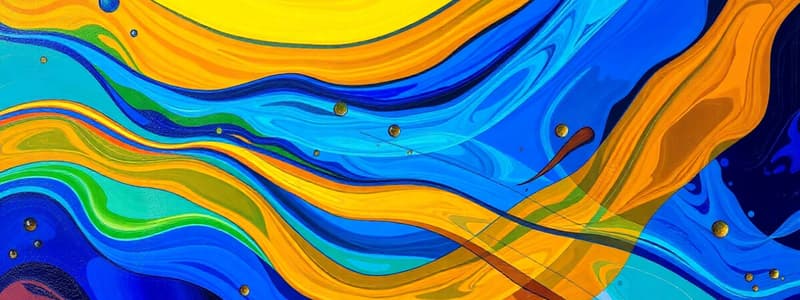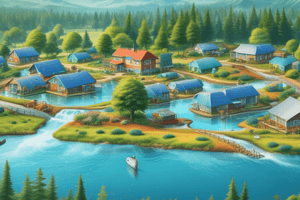Podcast
Questions and Answers
Water conservation primarily aims to address which of the following concerns?
Water conservation primarily aims to address which of the following concerns?
- Promoting the use of saltwater for domestic purposes.
- Accelerating the natural water cycle to increase rainfall.
- Managing and preserving the quality and availability of freshwater resources. (correct)
- Increasing the overall volume of water on Earth.
Why is access to fresh, clean water considered essential for public health?
Why is access to fresh, clean water considered essential for public health?
- It is necessary for the structural integrity of buildings and infrastructure.
- Consuming contaminated water can lead to various diseases. (correct)
- It is a primary component in the production of synthetic materials.
- It is required for efficient energy generation in thermal power plants.
How does water conservation contribute to the protection of wetland habitats?
How does water conservation contribute to the protection of wetland habitats?
- By diverting water from wetlands to agricultural areas to improve crop yield.
- By ensuring a sufficient water supply for the animals and plants that depend on these habitats. (correct)
- By increasing the salinity of water to discourage invasive species.
- By promoting industrial water usage to create artificial wetlands.
Despite the Earth being largely covered in water, why is there a concern about water scarcity?
Despite the Earth being largely covered in water, why is there a concern about water scarcity?
What characterizes 'consumptive use' of water as described in the context?
What characterizes 'consumptive use' of water as described in the context?
Which activity exemplifies non-consumptive water use?
Which activity exemplifies non-consumptive water use?
Sustainable water use strategies primarily focus on which objective?
Sustainable water use strategies primarily focus on which objective?
What is a key advantage of drip irrigation compared to traditional irrigation methods?
What is a key advantage of drip irrigation compared to traditional irrigation methods?
Which household practice is LEAST effective for conserving water?
Which household practice is LEAST effective for conserving water?
Besides providing rebates for toilet system repairs, what is another way cities can promote water conservation?
Besides providing rebates for toilet system repairs, what is another way cities can promote water conservation?
Flashcards
Water Conservation
Water Conservation
The responsible use of water to ensure enough for current and future generations. It includes reducing waste, preventing pollution, and distributing water fairly.
Consumptive Water Use
Consumptive Water Use
Water used for drinking, washing, and other essential needs that cannot be reused. This type of use depletes the water supply.
Water Scarcity
Water Scarcity
A lack of clean water due to overuse, pollution, or changes in climate. It can cause health problems and harm ecosystems.
Water Pollution
Water Pollution
Signup and view all the flashcards
Water Use in Society
Water Use in Society
Signup and view all the flashcards
Non-Consumptive Water Use
Non-Consumptive Water Use
Signup and view all the flashcards
Sustainable Water Use
Sustainable Water Use
Signup and view all the flashcards
Drip Irrigation
Drip Irrigation
Signup and view all the flashcards
Ways to Conserve Water
Ways to Conserve Water
Signup and view all the flashcards
Bubbling Fountains
Bubbling Fountains
Signup and view all the flashcards
Study Notes
Water Conservation Overview
- Water conservation is the responsible use of water, preserving both quality and supply.
- It involves preventing pollution and ensuring fair water distribution.
- Aims to maintain water levels for current and future needs, avoiding overuse and waste.
- Fresh, clean water is scarce despite its abundance as most water is salt water.
- Limited by factors like pollution, climate change, and growing population.
Importance of Water Conservation
- Essential for all life on Earth, crucial for public health.
- Contaminated water causes illnesses like diarrhea, cholera.
- Influences wetland ecosystems, impacting animals like otters and fish.
- Reduces energy costs associated with water treatment and pumping.
- Water scarcity leads to drought, impacting future water supply.
Societal Dependence on Water
- Used in transportation (engine cooling), chemical industry (dilutant), and agriculture (crop growth).
- Crucial for food production (vegetables, fruits, livestock).
Water Conservation Methods
- Consumptive Use: Water used for consumption (humans, animals) and cannot be reused (e.g., evaporation, transpiration).
- Non-Consumptive Use: Water not depleted from its source, can be recycled (e.g., hydroelectric dams).
- Sustainable Water Use: Regulating consumption, recycling wastewater, improving irrigation (drip irrigation).
Drip Irrigation
- Efficient crop watering method in agriculture.
- Water pipes with small holes placed near crops deliver water directly to roots.
- Customizable water flow to maintain soil moisture without oversaturation.
Specialized Water Features
- Examples of sustainable design: Bubbling fountains in desert environments.
- Connected to underground water reserves, cycling water for other uses (irrigation, wildlife).
Household Water Conservation Tips
- Regularly inspect pipes and faucets for leaks.
- Use a glass while brushing teeth, a small basin when shaving.
- Adjust washing machine water levels based on load size.
- Reuse water from washing fruits/vegetables for plants.
- Limit shower time, turn off faucet when applying soap/shampoo.
- Place objects (bricks, water bottles) in toilet tanks to reduce water usage per flush.
- Consider toilet upgrades; many cities offer rebates for replacements.
Studying That Suits You
Use AI to generate personalized quizzes and flashcards to suit your learning preferences.



